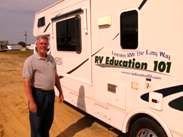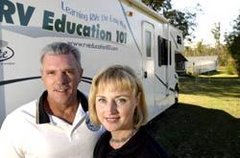The other day I was doing some preliminary planning for our first RV trip of the year. In addition to prepping the motorhome for another camping season, I decided to review some paperwork that I keep in the RV.
I’m glad I did, because I noticed that our emergency roadside service plan had expired. Recently, I went through the trouble of locating a 22.5-inch spare tire and rim for our motorhome. It would have been crazy to have the spare but no ERS plan to assist in getting the tire change. It just goes to show how easy it is to overlook things sometimes.
With that said, and with camping season right around the corner, I thought a good topic for an article would be some trip-planning reminders.
The first step is to plan the trip you are taking. Travel guides, magazines, state tourism boards and Internet sites offer valuable information to help plan your trip. Route your trip on a map or from an Internet trip-planning Web site. Here are a couple of helpful links for fuel cost calculations:
Fuel Cost Calculator
Local Gas Prices in the USA
Always keep an atlas or maps in the RV or towed vehicle. Driving a motorhome can be stressful, especially if you don’t know the route you will be traveling. Using a GPS system can make traveling much less stressful.
Here are my top 7 trip-planning reminders:
1. Plan your itinerary to include the campgrounds you will be staying at. Give a family member or friend a copy of your itinerary along with the campground contact information. Make campground reservations in advance, especially during the busy travel season.
2. Try to limit your daily driving to 350 miles a day or less. Not only will your trip be more enjoyable, but this will allow plenty of time to get set up at the campground before it gets dark and to enjoy some of the amenities the campground has to offer.
3. Make sure your emergency roadside service plan is up to date. If you don’t have one, you should get one prior to leaving on your trip.
4. Conduct pre-trip checks on your RV.
5. Check and refill any medications you will need. If you are under a doctor’s care, bring a copy of your medical records.
6. Be sure you have the following: credit cards, ATM card, checkbook, cell phone, address book and stamps, emergency contact numbers, a spare set of eyeglasses or reading glasses, a spare set of keys, RV owner’s manuals and warranty information. Also, make sure you have your passports, if necessary, and check the expiration dates.
7. Check the weather conditions for where you will be traveling each day. Take a weather radio receiver with you. Don’t travel in bad weather or during high winds.
Now, double check that everything is loaded in the motorhome before you hit the road. Have a great time exploring this wonderful country we live in.
Happy RV Learning,
Mark Polk
RV Education 101
RV University
RV Orientation
Go for the RV Gold
Follow us on FACEBOOK
RV Consumer
Subscribe to:
Post Comments (Atom)





No comments:
Post a Comment